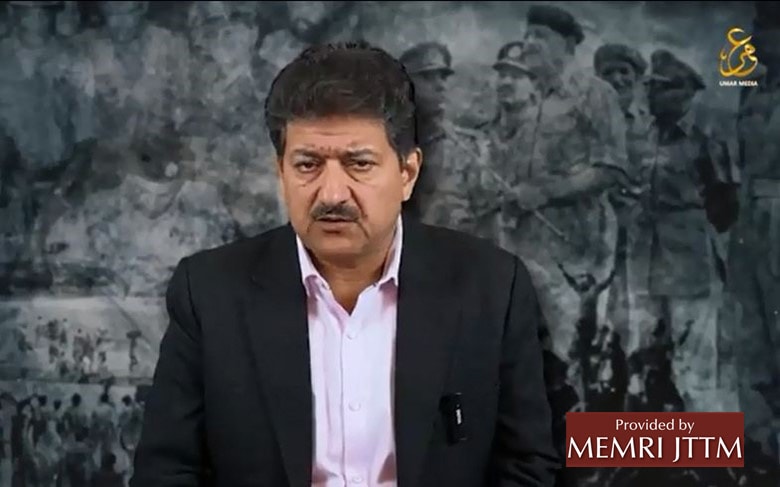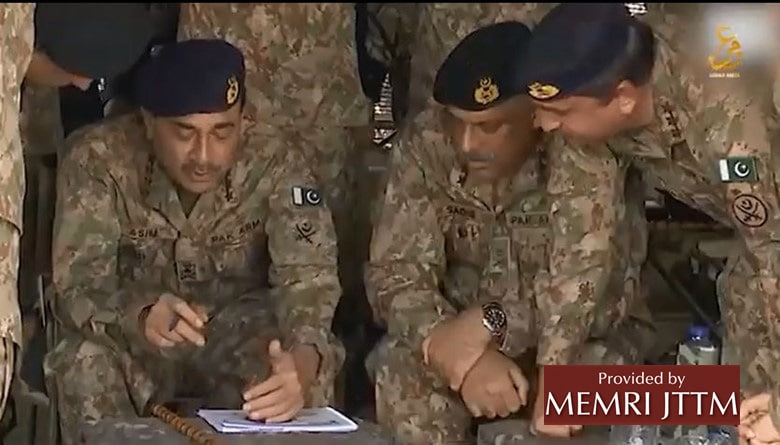In an Urdu-language video, the Tehreek-e-Taliban Pakistan (TTP) has accused the Pakistani military of committing atrocities against civilians in Pakistan, especially in the Baluchistan and Khyber Pakhtunkhwa provinces.
The 11-minute 33-second video, titled "Zer-e-Nazar 15: In the Words of Prominent People," was released by Umar Media, the TTP's propaganda wing. It features clips of interviews and television talk shows of prominent Pakistani journalists critical of the military's actions. These TV clips are likely to bolster TTP's claims.
The video was released as the Pakistani military announced a plan to launch Operation Azm-e-Istehkam, a counterterrorism operation in Baluchistan and Khyber Pakhtunkhwa. These two provinces are the most affected by terrorism and extremism.

Showing plainclothes Pakistani security forces dragging a man, a commentator in the video stresses that it is vital for the people of Pakistan to know about those who have "unleashed a mountain of cruelties" on civilians. The video also references the Pakistani military's role in historical events, including the 1971 war that led to the creation of Bangladesh.
"We have long said that the army imposed on this country is not sincere with the country, but no one seems prepared to accept it. However, listen to what Hamid Mir says," the narrator urges. A clip of senior journalist Hamid Mir is then shown; in it, he says:
"I want to tell you that although Pakistan formally fell apart on December 16, 1971 when the Pakistan army surrendered, the plan of the disintegration of Pakistan was formed in 1962. And this plan had not been made in India. Rather, it was made by Pakistan's president and army chief, General Ayub Khan, in 1962."

Hamid Mir is an outspoken Pakistani journalist
Hamid Mir is further quoted as saying: "We never tried to learn from our past mistakes and do not repeat the mistakes which led to the disintegration of Pakistan in 1971. If these mistakes are repeated in the future, Pakistan may again suffer damage."
In the clips, the outspoken journalist and television anchor further criticizes the Pakistani army. Pointing out that if a small group like Hamas, which has no tanks or heavy weapons, has kept up its resistance against Israel, which has the support of the U.S. and other countries, as well as a strong army with modern equipment, he asked why the strong Pakistani army surrendered in Dhaka after 13 days of war.
The Taliban narrator in the video claims that the Pakistani army has been committing atrocities in Baluchistan, but that the public is reluctant to hear about this from the TTP. However, the severity of these cruelties is underscored by Pakistani Senator Mushahid Hussain Syed, who compares them to the atrocities committed by Israel in Palestine.
Senator Syed is quoted as saying: "It is a painful story, a story of cruelty and injustice. Atrocities are being committed against the people of Pakistan – b, and defenseless individuals. I believe this is unacceptable in the 21st century in Pakistan." His quote is from a protest sit-in of the relatives of Baloch missing persons in Islamabad, who were allegedly picked up by Pakistani intelligence agencies.oys and girls, elderly parents

Pakistani army chief General Asim Munir (left)
Referring to the murder of Pakistani journalist Arshad Sharif in Kenya, the Taliban narrator states that journalists are not even safe from the Pakistani army when abroad. He alleges that it is involved in running brothels, human trafficking, and thefts.
In a clip included in the video, an unidentified social media activist claims that Pakistani army officers are abducting girls, primarily followers of the Agha Khan, from northern areas such as Chitral and Gilgit. These officers allegedly rape the girls and then send the girls on to their friends in Karachi.
"We want to convey the message that this army shows no mercy or humanity. From mistreating women to throwing people from helicopters, they commit these acts with ease," the video concludes.
Source: Archive.Org (U.S.), June 1, 2024
The full text of this post is available to subscribers.
Please login or register to request subscription information from MEMRI









